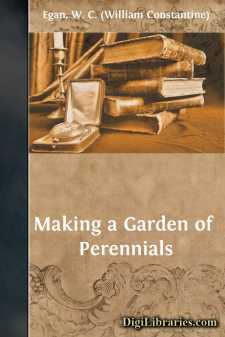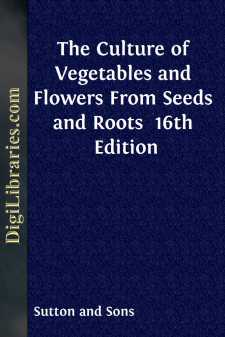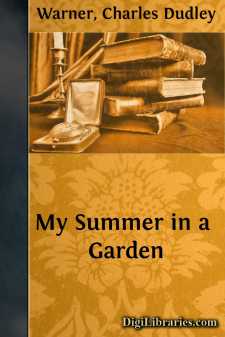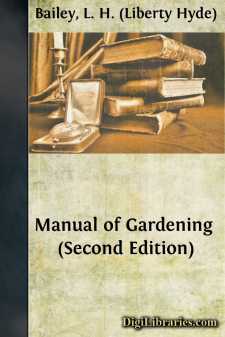Gardening
- Flowers 2
- Fruit 2
- General 8
- Landscape 3
- Vegetables 2
Gardening Books
Sort by:
by:
Gervase Markham
The Epistle to the generall andgentle Reader. Although (generall reader) the nature of this worst part of this last age hath conuerted all things to such vildnesse that whatsoeuer is truely good is now esteemed most vitious, learning being derided, fortitude drawne into so many definitions that it consisteth in meere words onely, and although nothing is happy or prosperous, but meere fashion &...
more...
by:
James Sheehan
CHAPTER I. HOW TO MAKE A LAWN. A smooth lawn is a great attraction of itself, even if there is not a tree or shrub upon it. When it is once made, a lawn is easily kept in order, yet we seldom see a good one. There are three things to be taken into consideration in securing a fine lawn. First, location; Second, quality of the soil; Third, the kinds of seed to be sown. This is the most important matter...
more...
INTRODUCTION The successful garden has a permanent basis. There must be some flowers that appear year after year, whose position is fixed and whose appearance can be counted on. The group classed as perennials occupies this position and about flowers of this class is arranged all the various array of annuals and bulbs. These last act as reinforcements in rounding out the garden scheme. Perennials are...
more...
THE LAWN: HOW TO MAKE IT AND HOW TO TAKE CARE OF IT HE owner of the average small home seldom goes to the expense of employing the professional gardener to do the work of lawn-making. Sometimes he cannot afford to do so. Sometimes skilled labor is not obtainable. The consequence is, in the majority of cases, the lawn,—or what, by courtesy, is called by that name,—is a sort of evolution which is an...
more...
by:
Sutton and Sons
THE CULTURE OF VEGETABLES Horticulture has a full share in the progressive character of the age. Changes have been effected in the Kitchen Garden which are quite as remarkable as the altered methods of locomotion, lighting and sanitation. Vegetables are grown in greater variety, of higher quality, and are sent to table both earlier and later in the season than was considered possible by gardeners of...
more...
by:
Samuel Felton
PREFACE. The following pages apply only to those English writers on gardening who are deceased. That there have been portraits taken of some of those sixty-nine English writers, whose names first occur in the following pages, there can be no doubt; and those portraits may yet be with their surviving relatives or descendants. I am not so presumptuous as to apply to the following most slight memorials,...
more...
INTRODUCTORY LETTER MY DEAR MR. FIELDS,—I did promise to write an Introduction to these charming papers but an Introduction,—what is it?—a sort of pilaster, put upon the face of a building for looks' sake, and usually flat,—very flat. Sometimes it may be called a caryatid, which is, as I understand it, a cruel device of architecture, representing a man or a woman, obliged to hold up upon...
more...
Mulches also serve a most useful purpose in preventing the ground from packing and baking by the weight of snows and rains, and the cementing action of too much water in the surface soil. In the spring, the coarser parts of the mulch may be removed, and the finer parts spaded or hoed into the ground. [Illustration: Fig. 154: Covering plants in a barrel.] Tender bushes and small trees may be wrapped...
more...
I THE WAYS OF THE WIND "Out of the veins of the world comes the blood of me;The heart that beats in my side is the heart of the sea;The hills have known me of old, and they do not forget;Long ago was I friends with the wind; I am friends with it yet."—Gerald Gould." Whenever a piece of the land is to be set apart for a garden, two mighty rulers must be consulted as to the boundaries. When...
more...
by:
Simon Harward
THE PREFACEto all well minded. Art hath her first originall out of experience, which therefore is called the Schoole-mistresse of fooles, because she teacheth infallibly, and plainely, as drawing her knowledge out of the course of Nature, (which neuer failes in the generall) by the senses, feelingly apprehending, and comparing (with the helpe of the minde) the workes of nature; and as in all other...
more...











